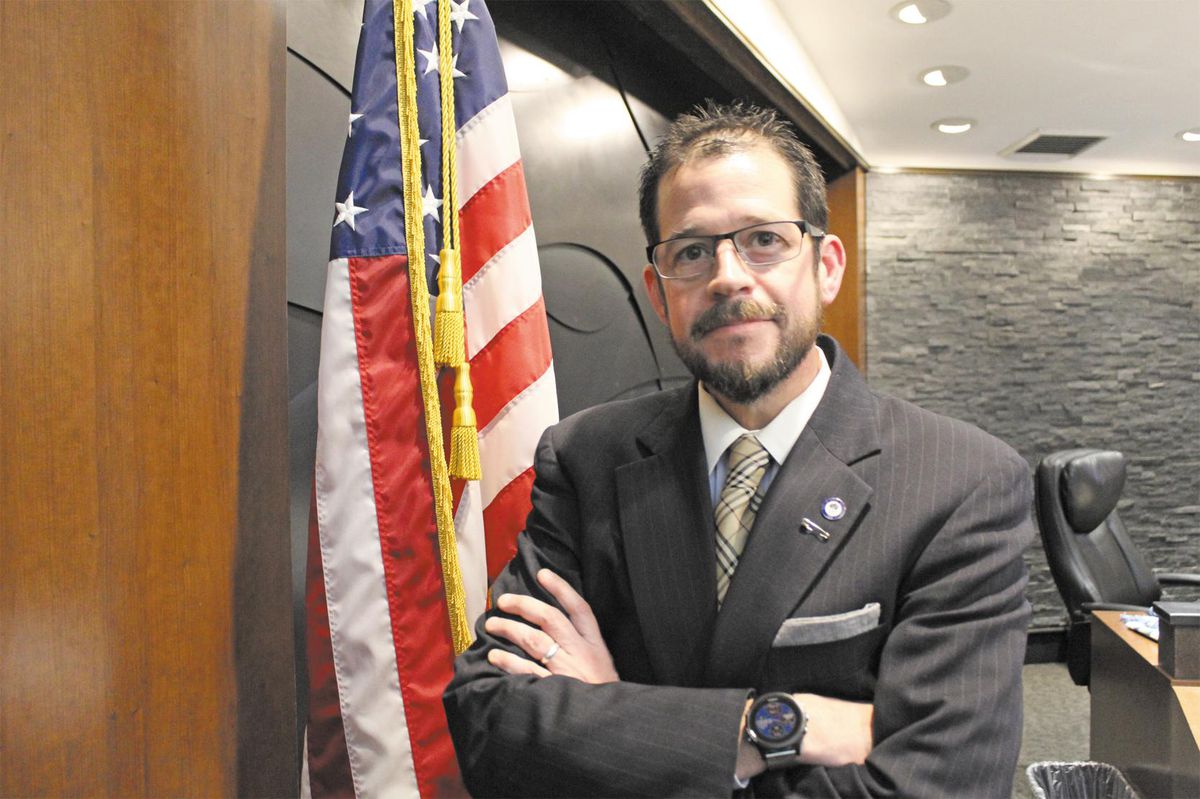
Photo by Ashiah Scharaga
Mayor Randall Stone presides over his second regular council meeting.
When Richard Muenzer approached the City Council dais on Tuesday (Dec. 19), he addressed its members with his characteristic brusque intensity. That evening, like many others before, the panel was tasked with a topic he knows well and is passionate about: homelessness.
That’s because the streets are his home.
In making his case for a low-barrier shelter, Muenzer talked about those who are hardest to provide shelter for: the addicted, and those who have pets or bicycles and other belongings that nobody can store.
Sheltering won’t work unless “we start building trust [and] we start saying, ‘Drop the barriers,’” he said.
Though the new panel has held only two regular meetings, Tuesday provided an indication on the direction it likely will take when it comes to addressing homelessness over the next two years. The council approved a location for Simplicity Village, paving the way for 46 seniors to live in a tiny home community, a long-planned project by the Chico Housing Action Team (see “Ready to roll,” Newslines, Nov. 29). It also directed city staff to work with the Jesus Center, Torres Community Shelter and Safe Space Winter Shelter in their quest to establish a year-round, 24-hour low-barrier shelter with 100-200 beds.
Efforts on the homeless front have taken on a greater urgency since the Camp Fire displaced thousands of Ridge and foothill residents, many of whom lived on the verge of homelessness prior to the disaster.
“We knew the need was going to increase,” Jesus Center Executive Director Laura Cootsona told the panel, “and we knew that it was up to us to ramp up for those who were going to drop down to the lowest level of our community, because that’s what we do.”
After the Camp Fire, Cootsona said she received a call from a Walmart executive who asked her about homelessness in light of the evacuee and homeless camp that had formed in the retailer’s parking lot.
Shortly after, representatives from the Jesus Center, Safe Space, CHAT and the Torres Shelter met because they knew they were in a pending crisis. A few days later, the Walmart Foundation asked how it could help the region, and then granted $1 million to the organizations “to help address the increased needs of the local homeless population.” That was on top of a separate $1 million donation for wildfire relief.
Their priority is to operate a low-barrier shelter 24/7 at a permanent location. Safe Space operates a low-barrier shelter, but it’s seasonal, and it often has to turn people away.
The organizations need the city’s help primarily with the acquisition of land, Cootsona explained. They have been looking at some pretty dilapidated properties and lots that can be used only temporarily, and nothing viable has turned up.
Speakers overwhelmingly expressed support for the concept, and the council was mostly in favor as well. Councilman Sean Morgan was the only nay vote. Mayor Randall Stone, who volunteers as the treasurer for Safe Space, abstained.
Following the vote, Vice Mayor Alex Brown said housing first and harm reduction are proven models for moving people out of homelessness, and she is excited to see the experts coming together with a proposal and resources to move forward.
Councilman Scott Huber added that the service providers need to go “full speed with it” and avoid a long, drawn-out process to prevent people from getting sick and dying this winter.
Simplicity Village had already made the rounds in front of the council, starting out as a concept for city staff to explore with CHAT. The final hang-up was a location—Tuesday, the council voted to enter a lease on a 2.6-acre lot on Notre Dame Boulevard, south of Morrow Lane. CHAT will sublease from the city, paying $1,200 per month the first year and $1,700 per month the second year.
The project is possible only because the city made a shelter crisis declaration months ago, loosening zoning restrictions and making Chico-based organizations eligible to receive state funding from a pot of $4.9 million reserved for Butte County.
Most folks spoke in support of Simplicity Village, and many of those against the project offered support for the concept, just not the location.
Frank Solinsky, president of employee-owned Payless Building Supply, was joined by a few of his colleagues. He said he supports CHAT 100 percent, but the property, just across the street from the business, isn’t designed for residential use. It is on a narrow street near a creek and their busy lumber yard. He questioned the long-term use of the property, which will provide what he views as sub-standard housing for older folks.
Morgan cited reservations about the undetermined end of the shelter crisis declaration, city liability and encouragement of additional tiny home villages. However, he added, “if this can be done successfully at this location, CHAT is the only organization that can do it.”
Chico Police Chief Mike O’Brien said that though he initially had reservations about the project, CHAT’s reputation is an overriding factor—the group has housed more than 80 individuals in more than 20 homes throughout the community, and Chico PD doesn’t know where most of them are.
Huber also championed the work previously accomplished by the nonprofit and signaled his confidence in the effort.
“This project has all the signs of being a future success,” Huber said. “It’s been extensively researched and planned, the organization that’s hosting it has a great reputation of successful management of its properties, the program is precedented, [and] there are numerous examples of tiny house villages operating successfully around the country.”
